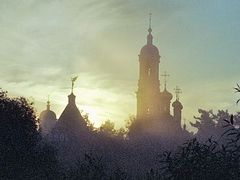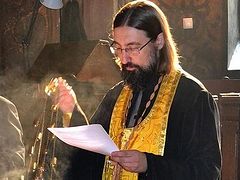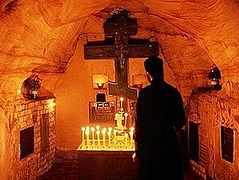In the name of the Father and of the Son and of the Holy Spirit!
For what shall it profit a man, if he shall gain the whole world, and lose his own soul?
The question of the future afterlife, whether voluntarily or involuntarily, makes every reasonable person stop and think. Sooner or later, both a religious person and a person indifferent to religion must face it. It is impossible to escape from thinking about what will happen to us after death, whether there is an afterlife and what it consists of. We believers know that there is a future life, as the revelation of God confirms to us. The Lord, correcting the error of the Sadducees who denied the resurrection of the dead, said to them: God is not the God of the dead, but of the living, for with Him all are alive.
Divine Revelation speaks not just about the preservation of spiritual substance—it speaks of the immortality of the individual. A person as a unique personality does not disappear without a trace. The body ages, but the person inside feels the same as he was in his youth. Why? Because the soul does not change, and our whole inner life is the property of the soul. We think with our soul. Our feelings and emotions are a manifestation of the soul. The soul is what hurts even when the whole body is healthy. After all, we say that it is not the brain that hurts, not the heart muscle—but the soul that hurts. The soul uses the body as a musician uses his instrument. If a string breaks, we no longer hear the music; but this does not mean that the musician himself is dead. What we see dying is the visible, gross body. The body cannot live and act independently without the soul, but the soul is immortal and can continue its existence without the body.
There is no death, the Church tells us, but only a transition from one form of being to another. And each of us has already experienced a similar transition once, when in the throes of birth, we left the cozy womb of our mother. A child, crying and protesting, comes into our world. The flesh suffers and trembles before the uncertainty and horror of the coming life, and so the soul also suffers and trembles, leaving the cozy womb of its body. The separation of the soul from the body occurs as mysteriously and incomprehensibly as their union in the womb.
After leaving the body, the human soul enters new conditions of life. It cannot change its condition by its own will, as was the case during its earthly life. And here the spiritual connection of the deceased person with the Church is of the utmost importance.
The Holy Fathers assert that until the universal Judgment of God, it is possible to change the afterlife state of the dead, since they belong, together with us, to the one Body of Christ; i.e., the Church. Christ, as the Destroyer of hell, has the power to open and close the gates of hell, and therefore it is necessary on the part of the living members of the Church to pray to the Lord for pardon for the dead.
Believing in eternal life as an immutable truth, the Church has been commemorating the deceased since ancient times. Prayer for the dead is not a requirement of church discipline, but a need of the heart. And to satisfy this need, the Holy Church has established a coherent and consistent system of commemoration.
Church statutes specify in some detail when and what funeral prayers to perform. The Church introduces them into public and private worship and into the home prayer of Christians. The most important and effective commemoration, according to the power of the great Eucharistic Sacrifice, is made at the Liturgy, when the particles removed in memory of the living and the deceased are immersed in the Divine Blood.
Of all the days of the week, the rule defines Saturday as the primary day of commemoration of the deceased. And this is not accidental. The Sabbath, as a day of rest, is most suitable for praying for the repose of the souls of the dead. Moreover, we know that it was on Great Saturday, on the eve of His Resurrection, that the Lord was “in the tomb with the body.” [This is part of the priestly prayer after the Great Entrance, In the tomb with the body, in hell with the soul as God, in paradise with the thief, and on the throne with the Father and the Spirit, wast thou O boundless Christ, filling all things.—Ed.]
The first people we remember when praying for the dead are our deceased parents. Therefore, Saturdays dedicated to the prayerful memory of the deceased are called “ancestral.” There are six such Ancestors’ Saturdays during the church year.
Funeral prayers are most intensified on two universal Ancestor’s Saturdays: Meatfare Saturday (a week before Great Lent), and Trinity Saturday. In addition, the second, thirth, and fourth Saturdays of Great Lent are also dedicated to the special commemoration of the deceased.
Our Russian Orthodox Church also has two other special memorial days: Tuesday of Bright Week, the so-called “Radonitsa” and today’s Demetrius Saturday.
According to tradition, it was established by Grand Duke Dmitry Donskoy. Having won the famous victory over Mamai on Kulikovo field on September 8, 1380, on his return from the battlefield, Dmitry Ioannovich visited the Trinity-St. Sergius Monastery. The Venerable Sergius of Radonezh, the abbot of the monastery, had previously blessed him for this battle and gave him from among his brethren two schema monks—Alexander Peresvet and Andrei Oslyabya. Both monks fell in the battle. Having commemorated the slain soldiers in the Trinity Monastery, the Grand Duke proposed to create this commemoration annually on the Saturday before October 26—the feast day of St. Demetrius of Thessalonica, the patron saint of Dmitry Donskoy.
For more than six hundred years, our Church has been performing this service every year. Before the revolution, this custom was strictly observed in the Russian army. In all military units, memorial services were served for Orthodox soldiers who laid down their lives on the battlefield for the faith, the tsar and the fatherland. Subsequently, on this day, they began to commemorate not only Orthodox soldiers, but also all the reposed, and this day became the universal day of remembrance in Russia.
On the days of commemoration of the reposed, Orthodox Christians send notes to the temple with the names of their reposed relatives who were baptized, i.e., were members of the Church. On these days, candles are supposed to be placed not before the icons, but rather before the Crucifix, on a special table called a “tetrapod.” There is also a good custom on memorial days to bring treats to the church for the poor. They are consecrated during the divine service and then distributed to everyone who wishes to receive them. The person who receives the treat prays “for all those who are now being remembered,” and his grateful prayer joins our prayer.
As a visible expression of the confidence of the living in the immortality of the deceased, “koliva” is prepared—boiled wheat grains mixed with honey. As the seeds contain life in themselves, in order to form an ear of corn and bear fruit, they must be put into the ground and desolve there. In the same way, the body of the deceased must be buried and experience corruption in order to rise later for a future life. After all, we believe not only in the immortality of the soul, but also in the resurrection of the whole person, i.e., the unity of soul and body, as we sing in the Creed: “I look for the resurrection of the dead and the life of the age to come.” That is why cemeteries exist in Russia—the body is placed in the ground like a seed in order to ascend with a new cosmic spring.
As we commemorate the dead today, we need to think seriously about eternal life ourselves. Each of us, without exception, having once appeared in this world, must certainly leave it. And there are no exceptions to this law of God. Our life on earth is fragile and vain. It’s clear and joyful course is often overshadowed by unexpected everyday sorrows and misfortunes. Our joys are mixed with grief; poverty is not far from wealth, health has no guarantee against diseases, and life itself can be stopped by death at any moment. The time of life is unstoppable and fleeting, so you don’t even notice the days flying by.
The thought of our fate in the future life should, it would seem, occupy us most of all. But paradoxically, the last thing modern man wants to think about is the question of death. The most striking difference between modern mass culture and Christian culture is the inability to die. Man approaches the threshold of death, not so much trying to look beyond the borderline as endlessly turning back and calculating with horror the ever-increasing distance from the time of his youth. Old age has changed from the time of “preparation for death”, when “it’s time to think about the soul,” and has become the time of the last and decisive battle for a place under the sun, for one’s last “rights.” It has become a time of envy. As our contemporary, Archbishop John Shakhovskoy, wrote: People deafened by vanity are no longer able to think about the great and eternal truths, for the comprehension of which at least a minute of divine silence in the heart, at least a moment of holy silence is needed.
The denial of a future afterlife makes earthly life completely meaningless. It becomes just “a gift in vain, an accidental gift,” as Pushkin wrote in difficult moments of his life. It allows no basis for a moral life. If there is no God, then everything is allowed, Dostoevsky said of such people. We were not—and we will not be; life absurdly flashes between two abysses of nothingness. Such unbelievers, deniers, either completely despair of earthly life and see no meaning in it, or live one base animal life, adhering to the Epicurean rule: take everything from life!
Death is the limit of earthly life during which a person can still reform. Holy Scripture says: Every man is a liar (Ps. 115/116), For there is not a just man upon earth, that doeth good, and sinneth not (Eccl. 7:20). We all sin constantly. If not by deed, then by word. If not by word, then by feeling or thought; and thus death always finds us as unpaid debtors before God. And for all this we will have to give an answer in due time. Therefore today, remembering our neighbors, let us also remember our soul in order to spend the time of our earthly journey with dignity, and cherish the time that the Lord has given us. Amen!




